One of the things that can be annoying when using the App Store is when you are trying to find a good app and dozens of fake reviews push junk apps to the top of the search results when all you want is to find the best of the best. Since not all reviews are honest, it can be difficult to filter the good from the bad on your own.
To help combat this problem, a new web app called AppRecs has been created that claims to be able to filter good reviews from the bad. This way, you can skip everyone’s junk reviews and junk apps and just see the best apps in the App Store that are truly worth checking out based off of honest reviews.
The AppRecs review filtering system
AppRecs uses a special algorithm to filter out reviews that are dishonestly bribed into the App Store. According to the developer’s blog, it does this by using a 7-level sorting system.
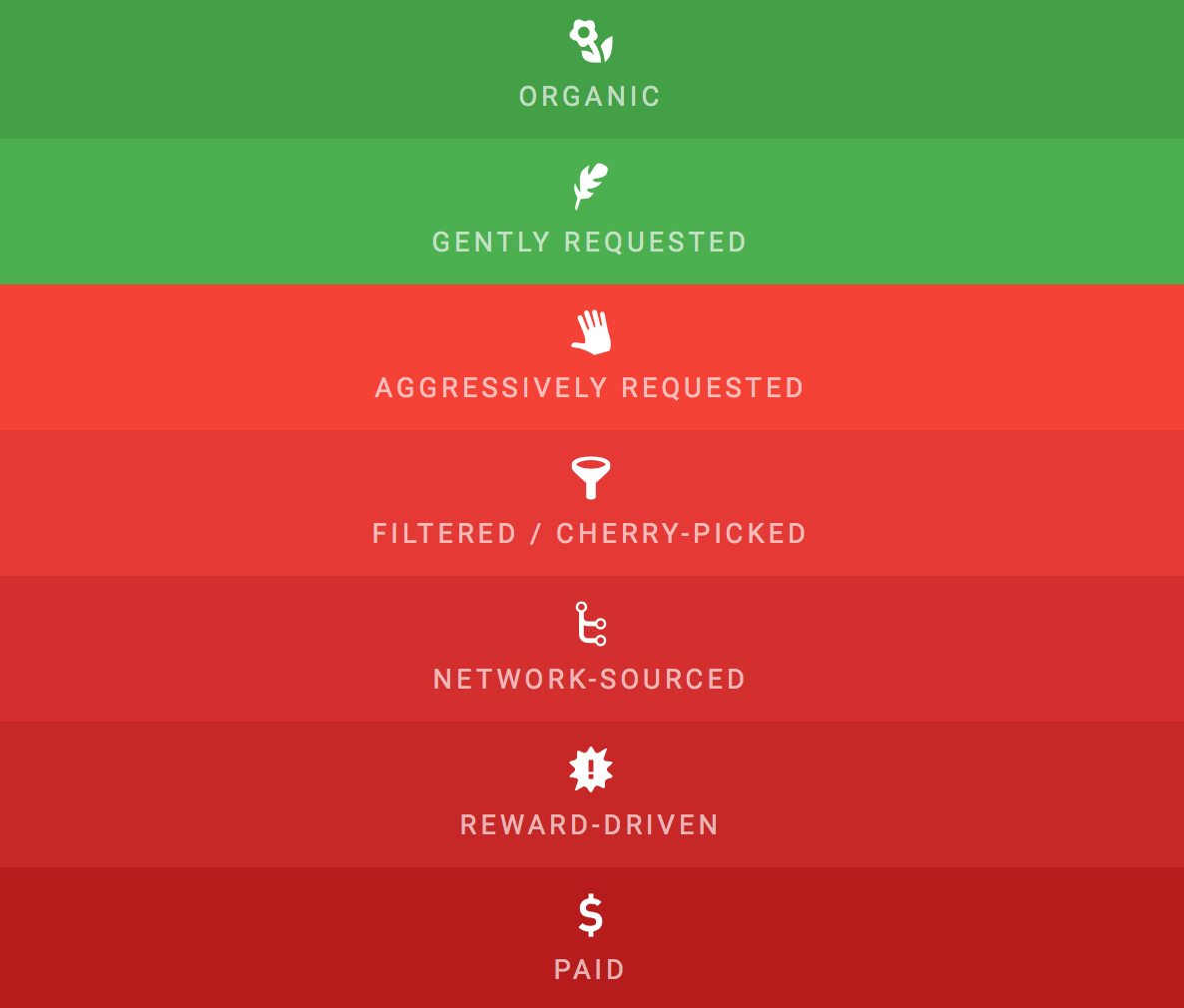
The seven types of review levels are:
Organic: These are considered to be the most trustworthy reviews there are. This is where a user has such a strong opinion on the app that they take it upon themselves to write a full and honest review about how the app makes them feel.
Gently requested: These are considered somewhat trustworthy in that the app may have requested the user to leave a review, but didn’t hound the user to the point of leaving a review just to shut the app up. Typically, the app has simply asked the user to leave a review once and if the user felt like it, they left a semi-honest review.
Aggressively requested: These are considered not-so-trustworthy because if the app annoys the user to death about leaving a review, then the user is less likely to explain how they really feel about the app, and will leave some junk review instead just to stop being hounded.
Filtered/cherry-picked: These are considered biased reviews and aren’t trustworthy because the app will ask for feedback from the user and if they say something negative, the app will not ask the user to leave a review, but if the user says something positive, it will ask the user to leave a review based off of what they’ve just said.
Network-sourced: These reviews are left by friends, co-workers, and family of the app developer who leave something good just to make the app look good whether the app really is or not. It’s a means of false-advertising to get users to think there are tons of happy users of the app so they’ll purchase the app.
Reward-driven: These reviews are typically fake and are a result of the app promising to reward the user with in-app features if they write something nice about the app in the App Store. Obviously, this isn’t coming from the user’s heart, and it’s just being posted to get the reward, so it’s not a trustworthy review.
Paid: These are the least trustworthy reviews of them all, when a developer actually pays people to write nice things about an app when the app may not be very nice or good for anything at all. This dishonestly is intended to fool potential app users into thinking they’re getting something good just to earn a quick buck off of them.
How does it work?
Obviously, this is very much a trade secret, but the developer has told us that the web app uses a variety of different techniques and algorithms to hide apps from search results that have tons of “fake” app reviews. Among some of the things the web app takes into consideration are:
- Length of the review
- Rating given the user
- Contextual content in the review
- Number of reviews made by the reviewer
- Average rating of reviews left by the reviewer
- Similarity of a reviewer to another reviewer
Because the whole web app is based off of algorithms and can’t be checked by hand, this obviously means that some good reviews may fall through the cracks at times, so it’s not a 100% accurate method of filtering good apps from bad, but it’ll still help give you a much more honest gist of what the apps you’re searching for are all about by removing those that can be counted out for being “fake” for sure.
Using AppRecs’ manual search filters
AppRecs does come with some manual filter options that you can select for yourself to better filter the apps you’re not interested in seeing in your search results. We’ll explain those options in our overview below:
First, visit apprecs.com in your favorite web browser, then search in the search box for any app you’re interested in. For our example, we’ll use Jetpack Joyride, a popular game in the App Store.
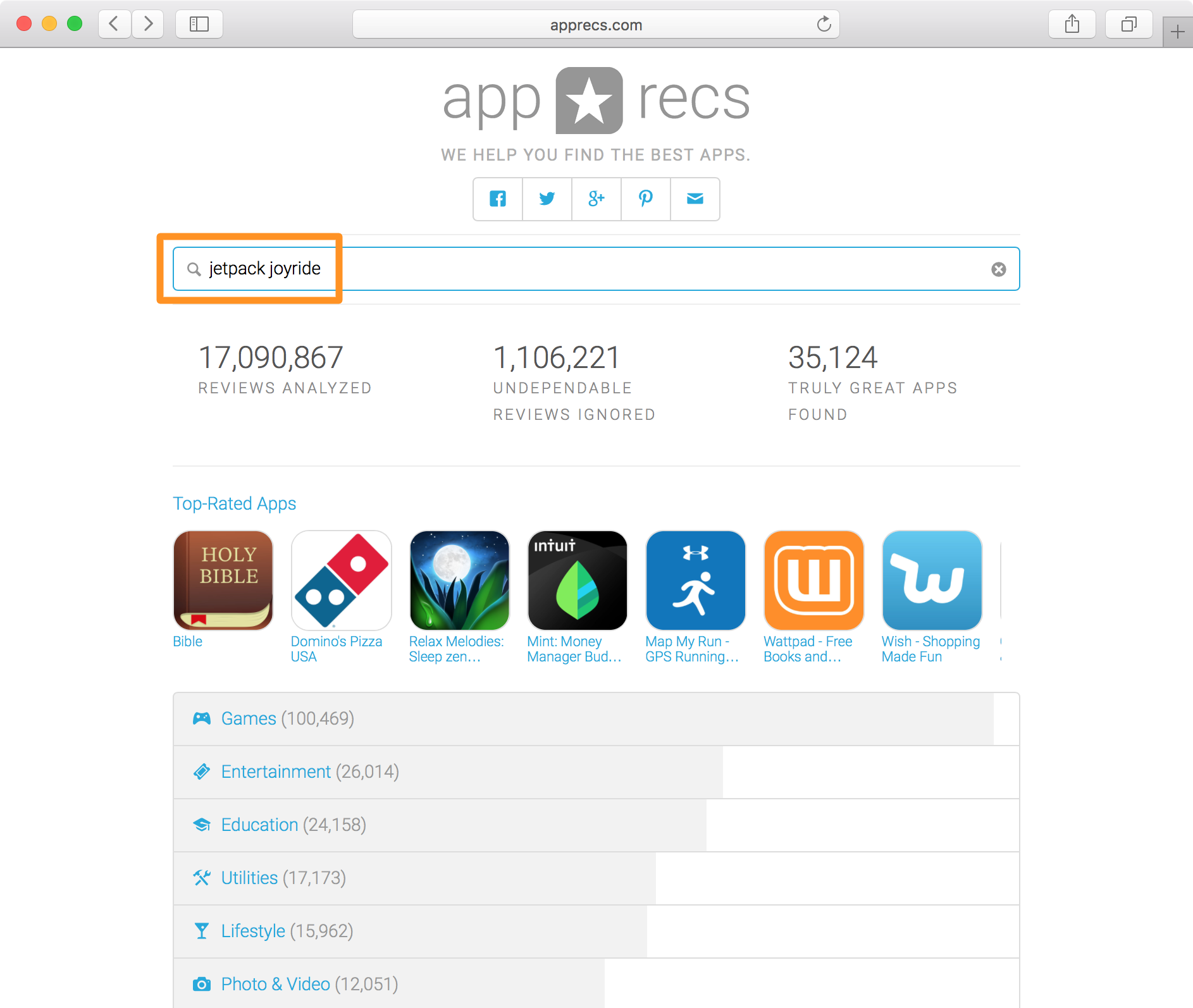
After we search for Jetpack Joyride, we’ll see Jetpack Joyride at the top of the list, and lots of related games underneath it. At this point, AppRecs is already doing its job and filtering out the junk. What you see in this list are the best apps related to Jetpack Joyride. We can then click on the “Filter” button to configure searching options through AppRecs:
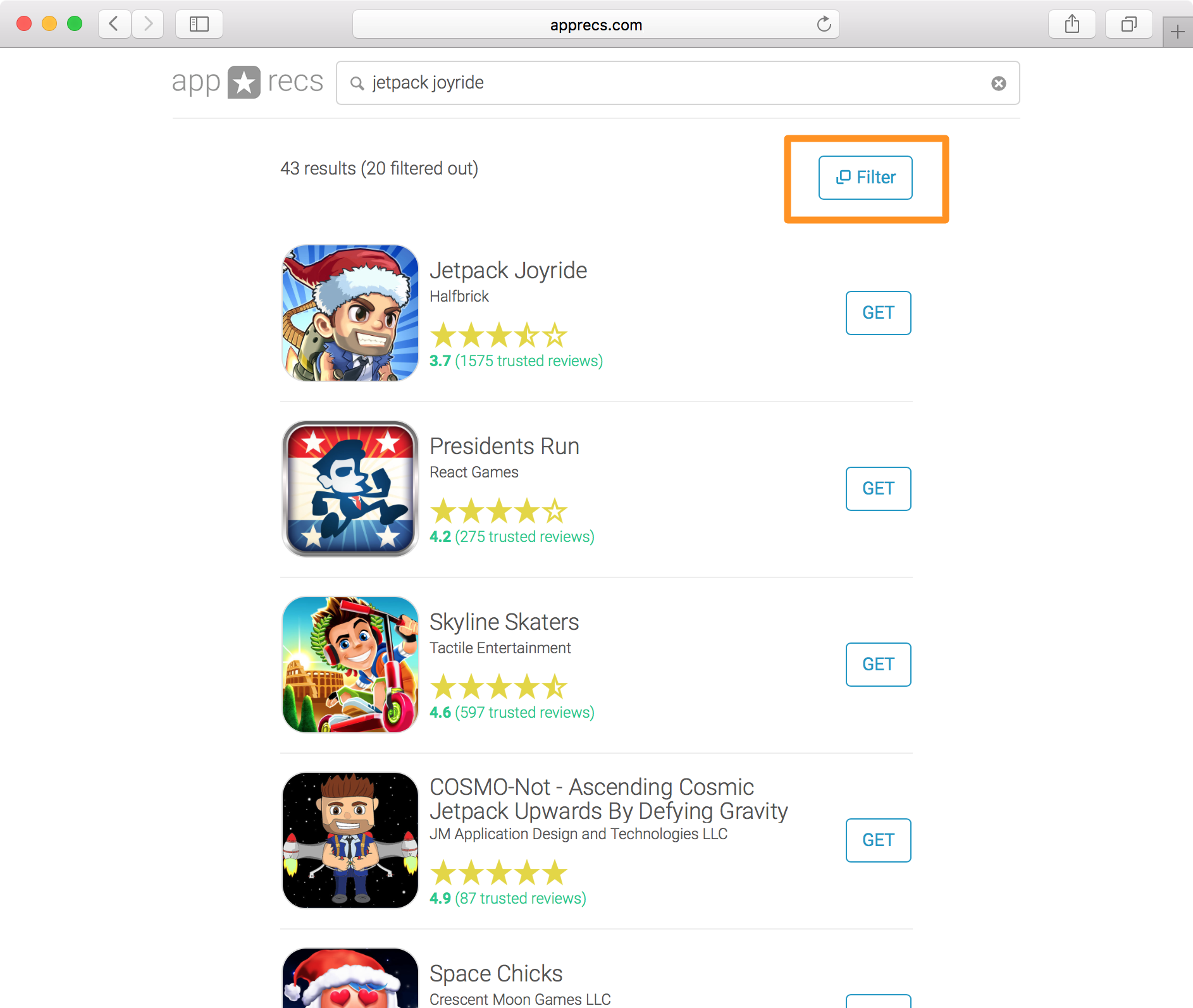
Once we do, we’ll see a lot of searching options that can help us better refine our search. As you can see, “High” is selected in the “Review Trustworthiness” field by default. This means that only apps with high review trustworthiness, or that AppRecs has deemed trustworthy, will appear in the search results.
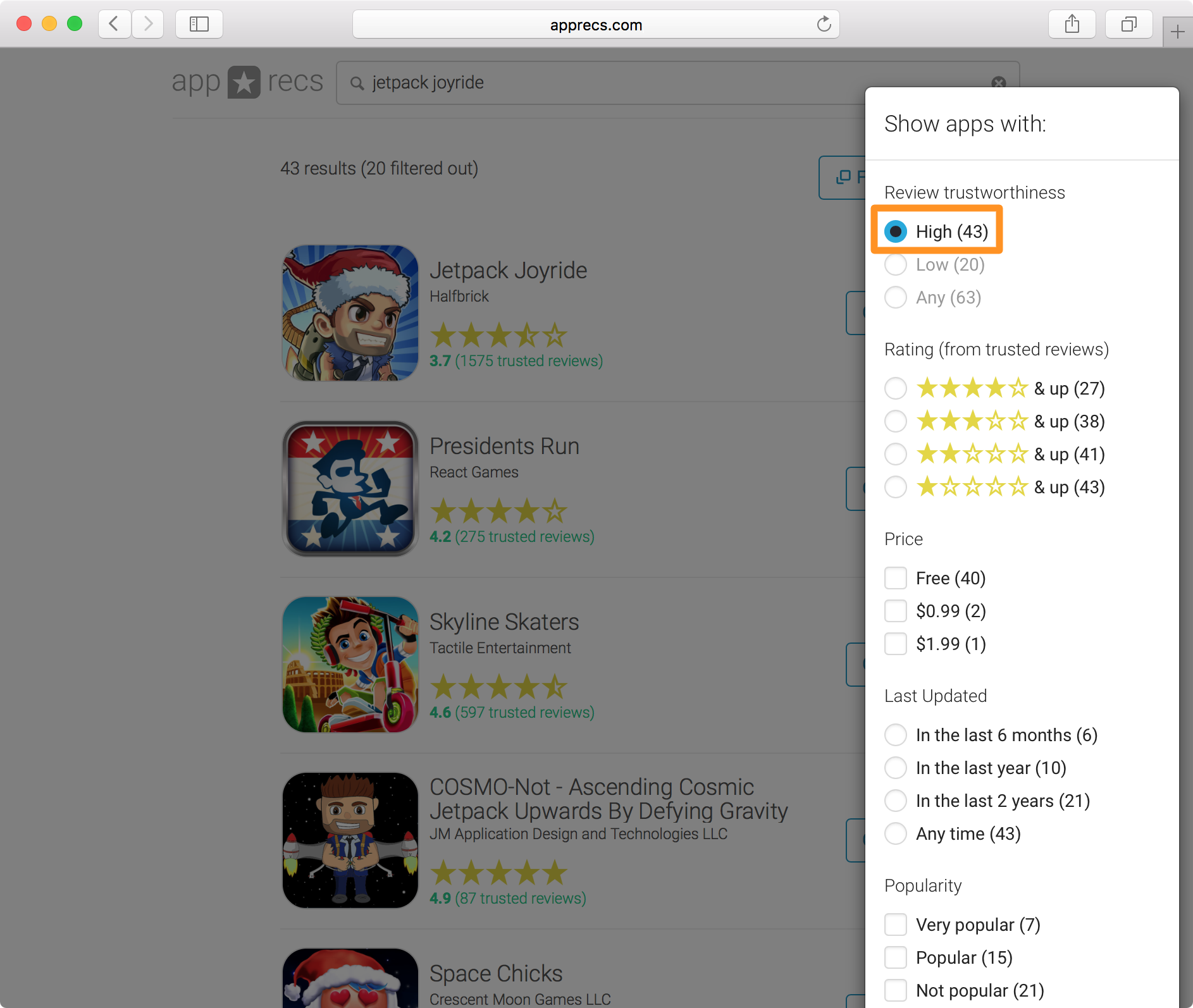
We can switch this option to “Low,” and now only the apps with the lowest review trustworthiness appear based on the web app’s search algorithms. Notice how the Jetpack Joyride game has disappeared from the search results:
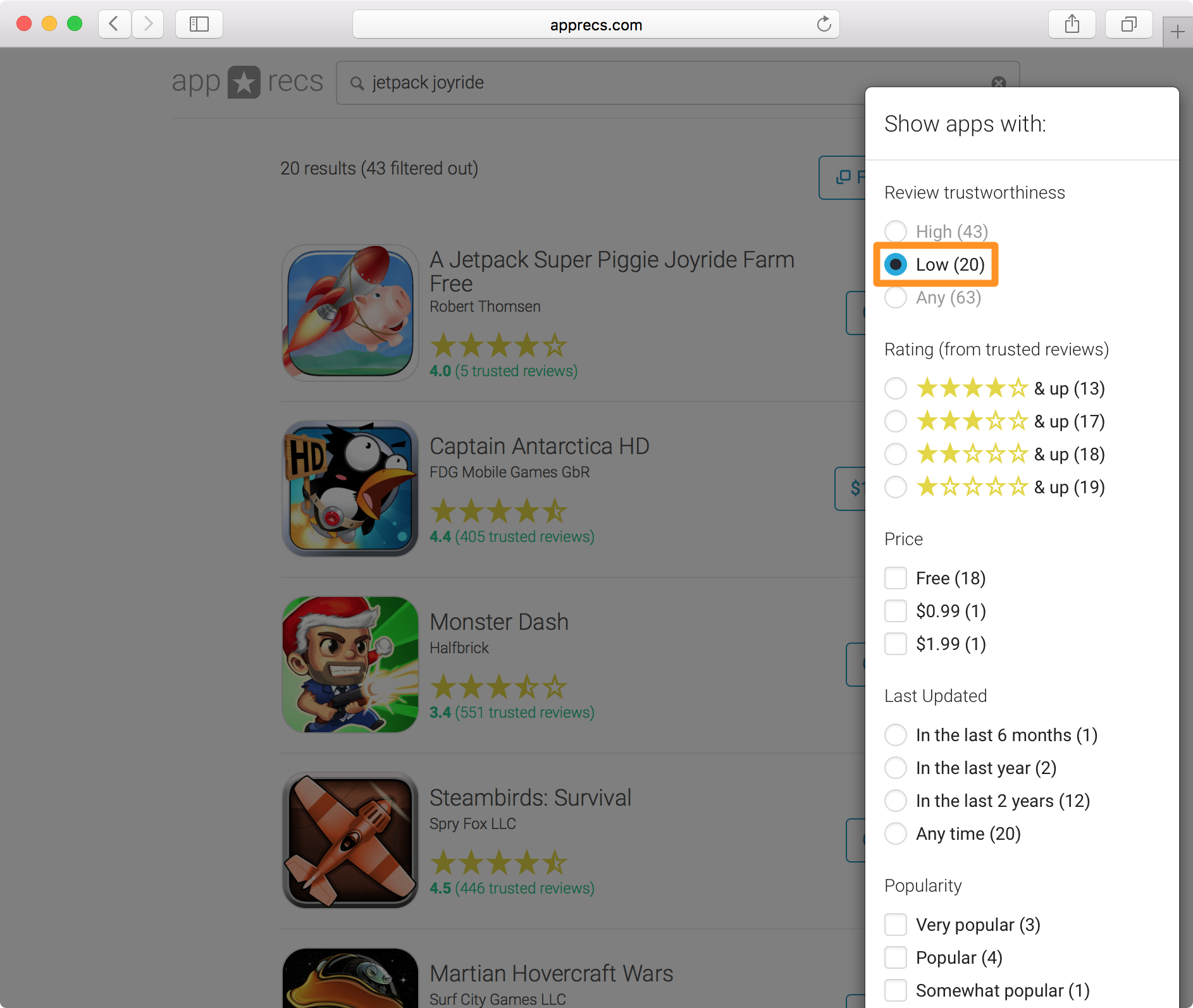
These search results are apps that AppRecs deems the least trustworthy in terms of the reviews the apps have received. It’s essentially saying, “hey, these apps have a lot of ‘fake’ reviews and you should probably avoid them based on your search.”
The “All” option under “Review Trustworthiness” shows all of the apps related to the “Jetpack Joyride” name, whether they have a lot of “fake” reviews or not.
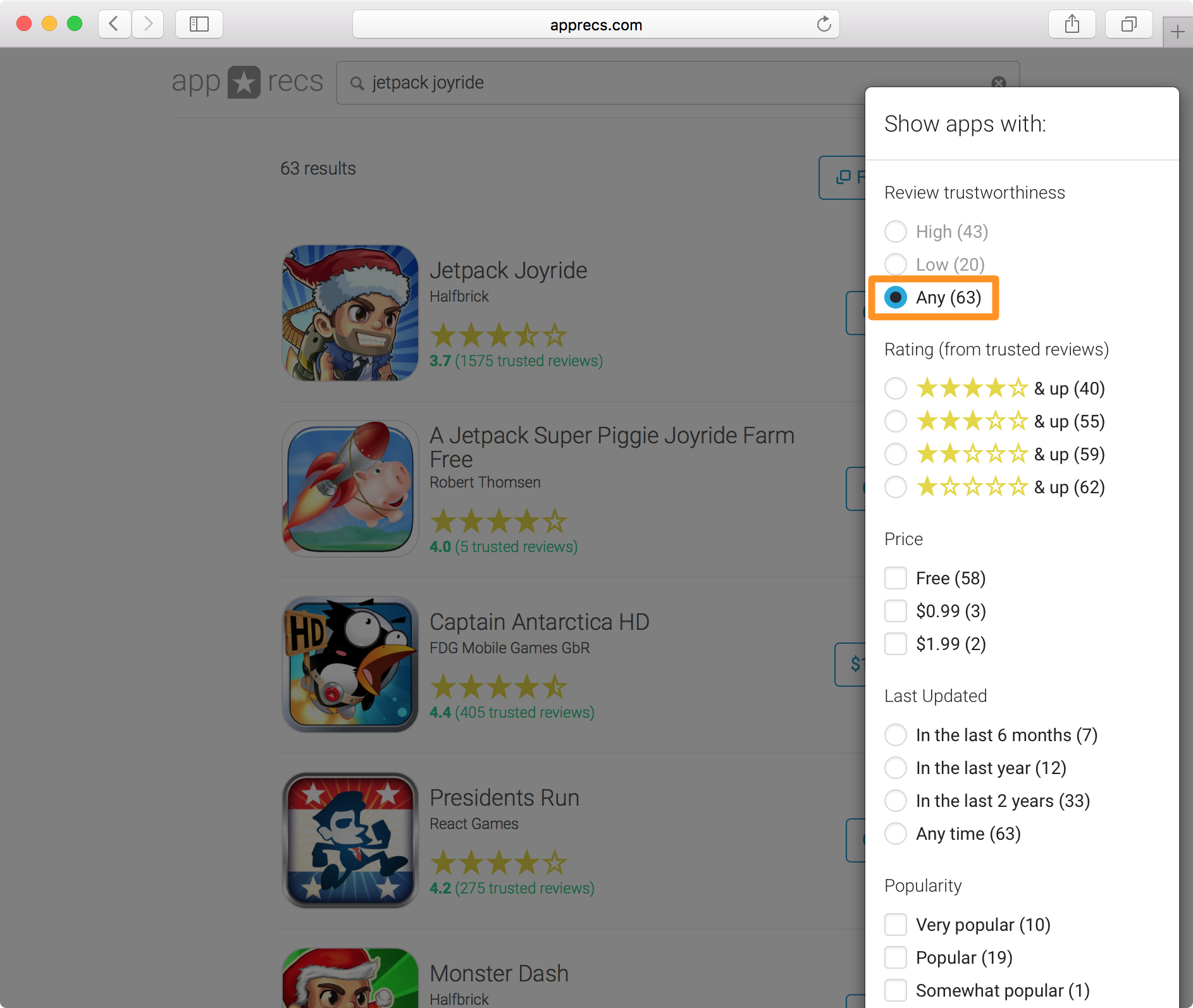
You’ll also notice there are many other filtering options you can take advantage of that Apple’s own App Store search engine doesn’t include. Those filtering options include:
Filtering by rating:
- Four stars and up
- Three stars and up
- Two stars and up
- One star and up
Filter by price:
- Free
- Paid (multiple paid options may appear depending on how many prices variances appear in the search results)
Filter by last updated:
- In the last 6 months
- In the last year
- In the last 2 years
- Any time
Filter by popularity:
- Very popular
- Popular
- Not popular
Filter by category:
- Books
- Business
- Catalogs
- Education
- Entertainment
- Finance
- Food & Drink
- Games
- Health & Fitness
- Kids
- Lifestyle
- Magazines & Newspapers
- Medical
- Music
- Navigation
- News
- Photo & Video
- Productivity
- Reference
- Shopping
- Social Networking
- Sports
- Travel
- Utilities
- Weather
Note that just like the prices filter, the categories filter will only display options relevant to what you’re searching for. So for example, when we search for “Jetpack Joyride,” the categories filter only shows “Games” and “Entertainment” because there obviously wouldn’t be a social networking app in these search results, or a utility app, etc.
Does AppRecs replace the App Store?
These search options are much more fine-tuned than the App Store’s search options are, because in the App Store, you’d never have the option of searching between “trusted” or “non-trusted” reviews, and you’d never have the option of searching for apps based on rating.
AppRecs doesn’t replace the App Store outright; in fact, all downloads for iPhone apps are still conducted through the App Store. AppRecs isn’t even an app that goes on your iPhone; instead, it’s a website you visit on your computer or iOS device to search the App Store for good content.
AppRecs is basically just a glorified App Store search engine that uses the App Store’s database to show you information on apps in the App Store, but with stricter filters that the App Store doesn’t offer.
When you search for an app with AppRecs, you will see content from the App Store that has been filtered based on the previously-mentioned algorithms and search features. When you attempt to download an app from AppRecs, you’re linked over to the App Store to download it.
So to summarize, it doesn’t replace the App Store for downloading apps, but if you’re looking for a better way to search the App Store, it can make a good side-by-side accessory to use alongside the App Store.
My thoughts on AppRecs
AppRecs doesn’t cost any money to use; you can visit the site for free and use it right now without paying anything. With that being said, it’s worth checking out if you have trouble with app discovery in the App Store because of junk apps constantly cluttering your search results.
I personally hate perusing the App Store for new apps because of this reason – Apple’s search methods are so bad at filtering the good from the bad. And app developers continue to push the boundaries of users by forcing them to up-vote junk apps so they appear in search results easier.
With AppRecs, you’ll be able to search for the apps you want to use on your iPhone or iPad and hide apps that aren’t being updated regularly, may be receiving too many fake reviews, and more.
If you agree, I’m sure you’ll enjoy using AppRecs to help filter junk from gems.
Conclusion
AppRecs is a cool way to better filter your app searches in the App Store. If you’re fed up with people taking advantage of the current ratings system in the App Store, then you might want to try AppRecs to take better control of what you’re shown when you search for something in the App Store’s seemingly-endless database of apps.
What are your thoughts on AppRecs? Share in the comments.
